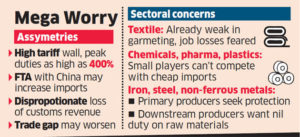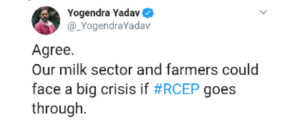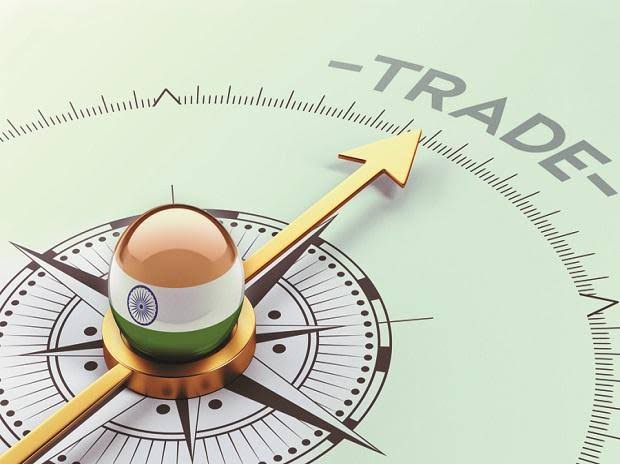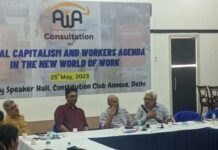FARMERS PLAN NATIONWIDE PROTEST AGAINST RCEP ON NOVEMBER 4 :
All India Kisan Sangharsh Coordination Committee (AIKSCC), a coalition of over 250 farmer organisations in the country, said tens of lakhs of farmers across the country would participate in a nationwide protest on November 4 to warn the government against going ahead with inclusion of agriculture in the RCEP free trade agreement, farmer leaders said here on Thursday.
The farmers would hold demonstrations and burn the effigy of “the RCEP document” at district, and lower administrative offices across the country asking the Narendra Modi led NDA government to desist from going ahead with the signing of the RCEP multilateral trade agreement involving 16 countries, AIKSCC convenor V M Singh and other working committee members told reporters. The Prime Minister is expected to participate in RCEP Leaders Summit in Bangkok on November 4.
FARMERS APPREHENSION:
Elaborating on the apprehensions of the farmers, the AIKSCC leaders said that RCEP is likely to hurt the Indian agriculture and dairy sector in a way no other trade agreement has so far. Till now, the general norm has been to keep agriculture out of Free Trade Agreements, a convention followed even in the ongoing EU-US free trade negotiations.

Forced reduction in tariffs to zero or near-zero would cripple the Indian dairy sector, thus affecting the livelihood of nearly 10 crore families. Similarly, threats are awaiting farmers who cultivate wheat and cotton (the challenge from Australia and China), oilseeds (the challenge of palm oil import) and plantation crops (pepper, coconut, areca nut, cardamom, rubber, etc).
RCEP ( Regional Comprehensive Economic Partnership ) is a trade pact being negotiated by 16 countries. Negotiations were formally being launched in November 2012 at the Asean summit in Cambodia The trade pact is close to being concluded.
ASEAN ( 10 COUNTRIES ) :
Brunei, Cambodia, Indonesia, Laos, Malaysia, Myanmar, the Philippines, Singapore, Thailand and Vietnam, China, Japan, India, Australia, South Korea and New Zealand.
KEY CONCERNS:
The RCEP will permanently bring down import duties on most agricultural commodities to zero. Many countries are looking to dump their agricultural produce in India.
Seed companies will get more powers to protect their Intellectual Property Rights, and farmers would be criminalised when they save and exchange seeds.
Foreign corporations could bypass national courts and sue our governments for favouring our farmers and workers at private arbitration tribunals.
STATEMENTS MADE BY ACTIVISTS:
At a public speak, P. Sainath discussed how India’s agrarian crisis has gone beyond the agrarian and is reaching into many other layers and sectors of society. Over 300,000 farmers have committed suicide in India between 1995 and 2015. A gross underestimate, but it is still a terrible figure that officialdom admits to.
Yogendra Yadav, an Indian activist raised his voice against RCEP on Twitter.


 “The farmer is the central issue in the country. The AAP movement in this state and elsewhere was addressing more urban-centric issues, our Yatra will take up those of the farmers and the Dalits,” he told Economic Times.
“The farmer is the central issue in the country. The AAP movement in this state and elsewhere was addressing more urban-centric issues, our Yatra will take up those of the farmers and the Dalits,” he told Economic Times.
Also Read: Leave Man Ki Baat, Could You Please Listen to This: Devnoor Mahadeva on RCEP
While addressing a press conference in Delhi on Friday, Congress leader Jairam Ramesh on Prime Minister Narendra Modi’s next month visit to Bangkok to sign RCEP agreement, said, “After demonetization and GST it’ll be a third big jolt to our economy when the Prime Minister will go to Bangkok next month and express India’s agreement to RCEP.” ” RCEP will result in liberalisation in imports from China. We don’t know what was discussed in Wuhan or Mahabalipuram but we can see the results, there will be liberalisation in imports from China. ‘Made in India’ is not mentioned now. It’ll encourage ‘Made in China ‘,” he added.
Gram Seva Sangh supports Reject RCEP. Activist Prassana of Gram Seva Sangh explains, ” Our farmers, milk mans’, vegetable vendors and other vendors are suffering because of the highly subsidized products from other countries. Already because of the government’s plans with the WTO the farmers and the labourers are in extensive trouble. On top of this RCEP is going to get them into more trouble to shut down. We all should reject this idea otherwise this country will drown. We all must go against this idea vigorously only then there will be changes. We all must come together for the change and stand together against this idea”.
There are trade economists and free trade proponents who believe that the RCEP is beneficial for the Indian economy. In a very compelling argument in The Hindu Business Line (7 January 2019), Geethanjali Natraj and Garima Sahdev infer that the long-term benefits of joining the bloc far outweigh the short-run costs. The authors state, “… if India wants its ‘Make in India’ to become globally successful, it must participate positively to become a part of the Asian value and supply chain which either begins or ends in India”.
CONS:
According to government data, India’s economy expanded at its slowest pace in over six years. Growth in the country’s Gross Domestic Product (GDP) stood at 5% in the first quarter of the current financial year (2019-2020), compared with 5.8% in the previous quarter and 8% in the quarter ended June 30, 2018. A slowdown in sales of cars to biscuits and lakhs of estimated job cuts across sectors plagued the economic growth of the country.
While the introduction of GST was thought of to be a major step in this regard by rationalising supply-chains and removing the fragmented nature of the markets, multiple rates of GST often cause problems of compliance across the value-chain of a commodity. On the input side, critical reforms need to take place in the labour market. Despite low relative labour cost, labour productivity in India in manufacturing is still one of the lowest in the world, and spatially fragmented labour laws escalate costs of the transaction.
Regional trade agreements like the RCEP need not always be beneficial from the “Make in India” perspective. “Make in India” is definitely the flagship project to attract foreign investment, this was never conceived of at the cost of the domestic industry. Even after more than a quarter of a century of economic reforms, Indian manufacturing is yet to mature to be competitive enough to face the vagaries of competition brought about by international trade. This situation prevails because of a host of unimplemented reforms in the product and factor markets.
Under such circumstances, the Indian industry is hardly in a position to compete in a level playing ground in a free-trade region. “Make in India” is meant to create enabling conditions for both domestic and foreign businesses to thrive. If the domestic industry has to thrive, it needs protection as also the enabling conditions created by factor and product market reforms. Mega-trade deals like the RCEP may derail the timing and coordination of such plans.
Tirsha is a journalism student from Bangalore.




























